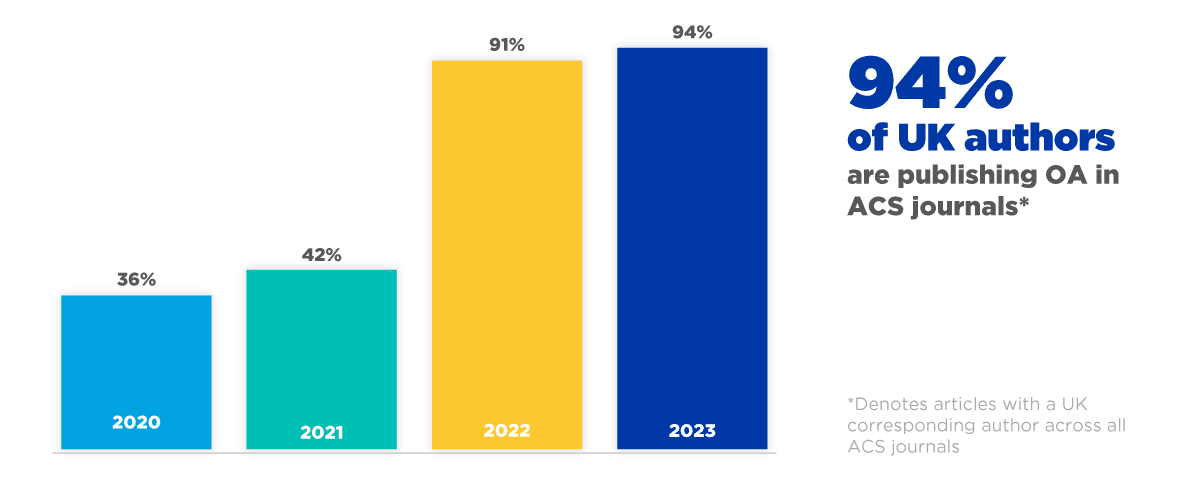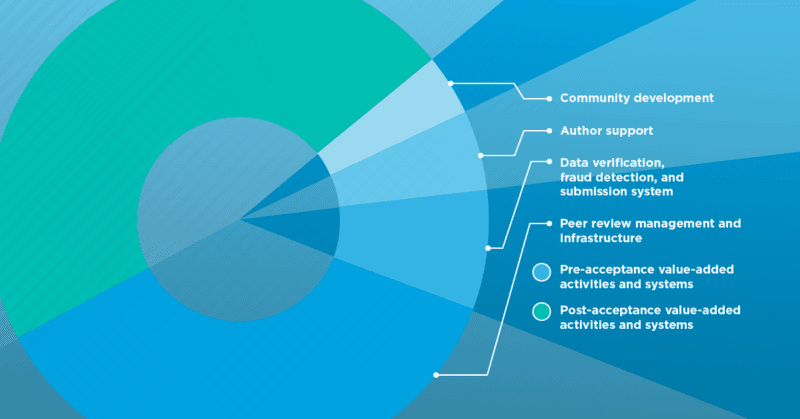Discover how ACS Publications' open access initiatives enable over 94% of UK authors to publish open access, in most cases at no cost to them.

More than 94% of authors from the UK who published in ACS journals last year chose open access (OA), with the vast majority at no cost to them because they were covered by our read and publish agreement in partnership with Jisc. ACS works with institutions and consortia worldwide to provide author-friendly, equitable, and efficient options for OA publishing. Authors at more than 1,500 institutes worldwide enjoy institution-covered open access publishing via similar read and publish agreements with ACS Publications.
The proportion of original research published as open access (OA) is continuing to grow, supported by institutions, publishers like ACS, and research funders the world over. The UK has long been a leader in the adoption of OA, with strong government policy support for over a decade. This has manifested in the uptake of read and publish agreements between institutions and publishers, such as ACS’ agreement with Jisc—which has grown the proportion of original research articles from UK authors published OA in ACS journals from 36% in 2020 to more than 94% in 2023:

ACS Publications places researchers at the heart of everything we do. We want to ensure that our journals provide options for every researcher to disseminate their findings in ways they prefer or are required to, and we’re proud to say that most authors who wish to publish OA in an ACS journal are able to do so at no cost to them through an institutional read and publish agreement, ACS sponsored open access, or through other types of funding for gold OA.
Investing heavily in supporting open access
For more than a decade, we’ve supported empowering authors to choose open access including encouraging authors to choose green OA by depositing their accepted manuscript in repository after a 12-month embargo. In 2016, we made more than $60M USD in free open access publishing vouchers—waivers to article publishing charges (APCs)—available to authors, encouraging them to choose OA publishing and building confidence in the scientific community that open content can be trusted. ACS provides free OA publishing for authors from the most economically disadvantaged countries. Authors affiliated with Primarily Undergraduate Universities (PUIs) who subscribe to ACS journals also have the option to publish gold OA at no charge, an initiative that’s sponsored by ACS. Finally, ACS also fully sponsors the diamond OA journal ACS Central Science, which means there are no charges for either readers or authors. We believe this long-term approach to supporting OA has contributed substantially to trust in open content and our extraordinarily high OA publishing rate observed in the UK.
ACS read and publish agreements are just one more mutually sustainable way for institutions to transition support from subscription access to OA publishing. Developed in partnership with institutions and consortia to meet the needs of their research communities, ACS read and publish agreements provide researchers, faculty, and students with complete reading access to all of ACS' hybrid journals, as well as covering OA publishing charges in ACS journals for affiliated authors.
The ACS read and publish agreement in the UK covers 85 institutions in England, Ireland, Wales, and Scotland. The agreement is designed to make choosing OA as easy as possible for the author, the librarian, and the institution as whole. In the publication process, when we identify that a corresponding author is affiliated with a participating institution, they’re prompted to opt in to OA, at no cost to them.
Our agreements also make things simple for administrators, further contributing to widespread global uptake. Our integration with Jisc Publications Router means that eligible manuscripts are automatically deposited in institutional repositories after they’ve been published in our journals, and institutional administrators and funding bodies can now report on their researchers’ OA publications in ACS journals through the OA Switchboard alongside other participating publishers.
Answering the call for wider adoption of green open access
While gold OA has been the primary mechanism for open access in the UK for many years, an increasing number of funders and institutions are calling for authors to keep the right to post their accepted manuscripts in a repository, immediately upon acceptance for publication in a journal. This is sometimes referred to as zero-embargo green OA.
Most publishers don’t have a dedicated route to support zero-embargo green OA. Instead, authors have to choose between paying a full-price article publishing charge (APC) to publish the version of record as gold OA (which also allows them to immediately self-archive their accepted manuscript), or delaying self-archiving for a 12-month embargo period after their article is published.
Our zero-embargo green open access route, introduced in September 2023, is a new option to meet these growing interest in zero-embargo green OA. This option means that authors who prefer to publish in ACS hybrid journals, but who do not have coverage from a read and publish agreement, can meet zero-embargo green OA requirements without first needing to publish the version of record as gold OA.
Our zero-embargo green OA option doesn’t impact author rights; it simply covers the costs of taking the manuscript from initial submission through to the final editorial decision. These costs, such as community development, author support, data verification, fraud detection, and managing the vital peer review process, would otherwise be covered by an institutional subscription, a gold OA article publishing charge, or a read and publish agreement.

Authors who initially publish through our zero-embargo green OA path and then later choose the gold OA route for their manuscript will have their APCs discounted by the cost of the zero-embargo green OA charge that they have already paid.
Maintaining the quality of the scholarly record
Articles published in ACS journals are among the most trusted, most cited, and most read in chemistry and its related fields. The initial editorial process that all papers undergo encompasses quality and research integrity checks by our expert staff, and management of the intensive peer review process that helps develop articles into the strongest possible representation of our authors’ work.
This part of the publishing journey is vital in ensuring that readers can trust the research they read across our portfolio of journals. This is why, in the few cases it applies, payment for the zero-embargo green OA option typically occurs during the peer review process, after the manuscript has first been reviewed by our international team of expert journal editors.
Authors choose our zero-embargo green OA option by noting it in their manuscript. When the article is accepted for publication, they can immediately post their accepted manuscript in an OA repository, enabling others to freely distribute, remix, adapt and build upon the deposited work (including for commercial purposes).
Supporting country-specific pricing based on economic conditions
We also recognize that fees associated with the publishing process can be a barrier to under- or un-funded researchers, particularly those in emerging economies. As a result, the cost to publish zero-embargo green open access is subject to the same special country discounts as our gold OA article publishing charges for authors in World Bank Group A and B countries – and in common with gold OA APCs, an author's ability to pay the zero-embargo green open access charge is never taken into account when the final editorial decision is made. Perhaps most importantly, authors originating from the most economically disadvantaged countries are often able to publish in our fully OA journals ACS at no cost, making the green route obsolete to their circumstances.
Working together for the benefit of chemists everywhere
ACS Publications is a division of the American Chemical Society. We’re a congressionally chartered non-profit organization whose margin (revenue minus operating costs) is used to advance our vision of Improving all people’s lives through the transforming power of chemistry. Much of this investment in achieving our vision and mission is returned to society through academic institutions by way of research grants, used to support chemistry education, and other charitable causes. In 2023, ACS awarded over $18 million in research grants.
Your feedback is invaluable to all the teams within ACS Publications. If you’d like to share your thoughts, please contact us—your comments help us meet the needs of researchers, institutions, and all other stakeholders in the global scientific community.
You can compare the different routes to OA that ACS Publications provides, including which services are included as part of each pathway, on the ACS Open Science website. You can also refer to our zero-embargo green OA FAQs for more information.